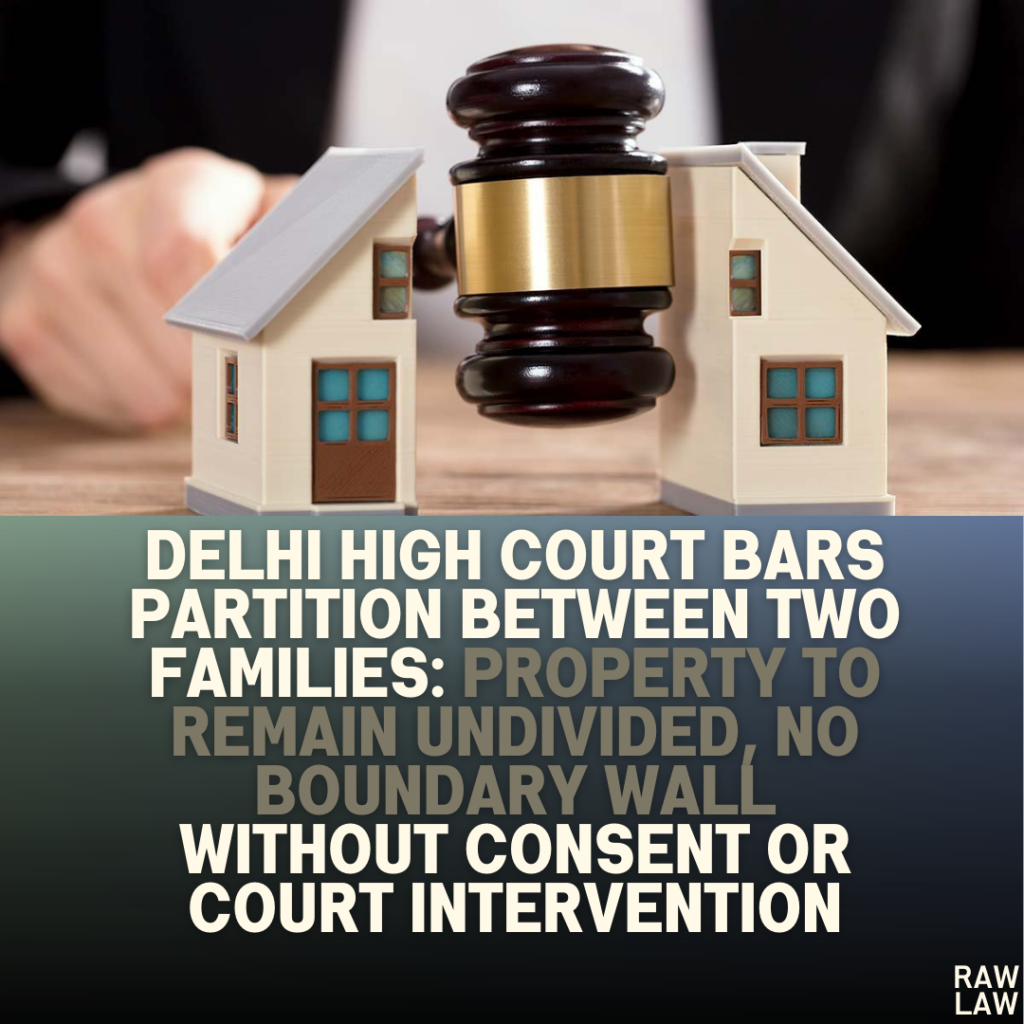Court’s Decision:
The Delhi High Court resolved two interconnected civil suits regarding the ownership, partition, and use of a property located at 4 Cavalry Lines, Civil Lines, Delhi. The Gupta family and the Jain family had entered into two separate agreements to sell (ATS) half shares of the property. The court found that the property could not be physically partitioned under the terms of the perpetual lease deed and rejected claims for partition by metes and bounds. The court ruled that the families’ respective portions of the property were to be treated as undivided, and neither party was entitled to alter the property without mutual consent.
Facts:
The dispute arose from the sale of the suit property, 4 Cavalry Lines, to the Gupta and Jain families through two separate ATS in 1983. The property was held on a perpetual lease from the government, and the sale was complicated by the existence of excess vacant land, which required further approval for demarcation. Both families took possession of their respective portions of the property but conflicts arose over the use and partition of the property, leading to several suits filed between 1992 and 1998.
The Gupta family sought a declaration that the property was incapable of being partitioned and a perpetual injunction to prevent the Jain family from altering the property. The Jain family, on the other hand, sought a declaration that they owned the northeastern portion of the property and requested an injunction to complete the construction of a boundary wall.
Issues:
Whether the property was capable of being partitioned physically.
Whether either party could claim specific portions of the property as their own.
Whether the Jain family was entitled to construct a boundary wall.
Whether the property was intended to be sold as undivided or partitioned land.
Whether the parties were entitled to mutual exclusive possession of portions of the property.
Petitioner’s Arguments:
The Gupta family argued that the property was undivided, and under the terms of the lease deed, no construction or partition could take place without mutual consent or approval from the authorities. They claimed the property had been shared since possession, with common areas like lawns and driveways being used jointly. They sought to prevent the Jain family from constructing a partition wall, arguing that it would disrupt the undivided nature of the property.
Respondent’s Arguments:
The Jain family contended that the property was divided at the time of purchase, and they had exclusive rights to the northeastern portion. They claimed that the agreements and subsequent actions demonstrated the intention to partition the property and that they were entitled to complete the construction of a boundary wall to delineate their portion. They also pointed to the existence of separate sale deeds and the fact that both families had been using different portions of the property separately for years.
Analysis of the Law:
The court examined the perpetual lease deed, which restricted any partition or construction on the property without the express permission of the Military Estate Officer. The court found that the terms of the lease and the Urban Land (Ceiling and Regulation) Act, 1976, placed significant limitations on the division of the property. The agreements to sell were also analyzed, revealing that while the property was sold in two half shares, the physical division was never finalized due to legal constraints.
Precedent Analysis:
The court referred to precedents that established that a property held under a perpetual lease cannot be partitioned without the necessary approvals, and that physical partition of land subject to government regulations requires mutual consent. The court also considered cases related to the division of jointly owned properties, emphasizing that unless the legal requirements for partition are met, the property remains undivided.
Court’s Reasoning:
The court reasoned that while both families had taken possession of separate portions of the property, the legal requirements for a formal partition had not been fulfilled. The court emphasized that the property was held under a lease that explicitly prohibited alterations without prior consent. The court found that both families were bound by the terms of the lease and the agreements they had entered into, which required mutual cooperation for any changes to the property. The Jain family’s attempt to build a boundary wall was seen as contrary to the undivided nature of the property, as outlined in the lease deed.
Conclusion:
The court concluded that the property at 4 Cavalry Lines was to remain undivided under the terms of the perpetual lease, and no party was entitled to partition the property physically. Both the Gupta and Jain families were directed to maintain the status quo, and any further actions concerning the property would require mutual consent or court intervention. The court also issued a perpetual injunction restraining the Jain family from constructing a partition wall or making any other alterations to the property without the approval of both parties or the court.



